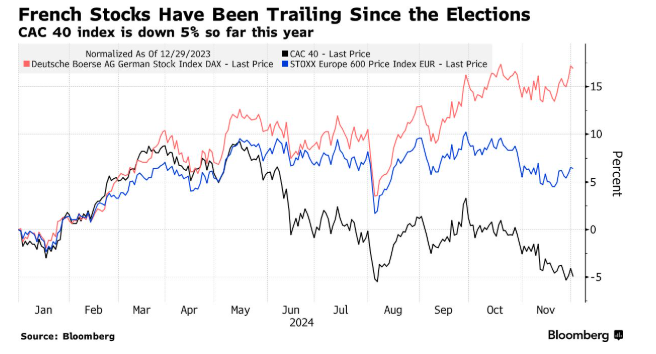December 2, 2024
France’s “Moment of Truth” Looms as Prime Minister Michel Barnier’s Government Faces Collapse
Prime Minister Michel Barnier has issued a stark warning that France has reached its “moment of truth,” as far-right leader Marine Le Pen positions herself to join a left-wing coalition to bring down his government. The collapse could happen as soon as this week, potentially plunging France into political uncertainty.
No-Confidence Votes Loom
On Monday, Le Pen’s National Rally, alongside a left-wing alliance, submitted motions for no-confidence votes against Barnier’s administration. The parties supporting Barnier lack the numbers to counter a united front from these two opposing factions, putting the government on the brink of collapse, possibly as early as Wednesday.
Le Pen’s Growing Influence
The National Rally emerged as the largest single party in France’s lower house of parliament following a snap election in June, significantly bolstering Le Pen’s political clout. Despite Barnier conceding to nearly all her demands to adjust France’s 2025 budget, including dropping a proposal to cut drug reimbursements and avoiding tax hikes on electricity, Le Pen announced her party would still not support the budget. This decision paved the way for a no-confidence vote and the potential toppling of Barnier’s government.
Barnier Appeals to Lawmakers
“It is now up to you, as a parliamentarian of the nation, to decide whether to equip our country with responsible financial laws that are indispensable and useful,” Barnier told lawmakers on Monday. “Or if we are entering uncharted territory.”
In an effort to move forward without a parliamentary vote, Barnier invoked Article 49.3 of the French Constitution, which allows legislation to pass but simultaneously opens the door for no-confidence motions. Support from the National Rally could have allowed him to secure the budget and avert a government collapse, but that support never materialized.
Budget Crisis Intensifies
The standoff comes at a precarious time for France’s finances. The government must pass a budget by the year’s end or resort to untested emergency legislation to avoid a financial shutdown. While Barnier abandoned some contentious measures to placate Le Pen, such as reducing drug reimbursements and raising electricity taxes, he stood firm on delaying pension indexation to inflation. Le Pen’s party submitted an amendment to block this delay, but it was not included in time.
Le Pen’s Defiant Stance
“Barnier did not wish to respond to the request of the 11 million National Rally voters,” Le Pen said after the announcement. “He said that everyone should shoulder their responsibilities, so we will shoulder ours.”
As France teeters on the edge of political instability, the coming days will determine whether Barnier’s government survives or if the country is thrust into uncharted political waters.

The ongoing budget crisis in France has triggered a wave of investor anxiety, with sovereign debt markets responding harshly and borrowing costs surging. Prime Minister Michel Barnier has warned of a looming “storm” in financial markets if his government is ousted amid mounting political challenges.
Rising Financial Pressures
France’s sovereign debt has come under scrutiny, with bond yields reflecting increased risk. The spread between France’s 10-year bonds and Germany’s widened by seven basis points on Monday to 88 basis points—approaching its highest level since 2012. Borrowing costs last week briefly reached levels comparable to Greece’s, further signaling investor unease. Meanwhile, France’s CAC 40 Index ended flat, and the euro dropped by 0.8%.
Investors have grown increasingly concerned about France’s political instability, especially as the government attempts to implement measures to curb its deficit. Barnier’s original budget proposal aimed to cut the deficit to 5% of GDP by 2025, down from 6.1% this year, through €60 billion ($63 billion) in tax hikes and spending cuts.
However, Budget Minister Laurent Saint-Martin revealed over the weekend that amendments to the budget would add nearly €10 billion in costs. These developments have added to the uncertainty surrounding the fiscal trajectory of Europe’s second-largest economy.
Opposition Challenges
The National Rally, led by Marine Le Pen, has strongly opposed the government’s budget, criticizing its impact on household incomes.
“There is no way out for a government that reconnects with the thread of Macronism, which refuses to take into account the social emergency at the end of the month and which ignores the need to relaunch growth,” wrote National Rally President Jordan Bardella on social media platform X.
The opposition’s criticism underscores the widening gap between the government’s fiscal priorities and the populist policies advocated by Le Pen’s coalition.
Political Fallout
The political stakes are high. Following the submission of no-confidence motions by opposition groups, a mandatory 48-hour period must elapse before parliamentary debate begins, with a no-confidence vote to occur within three days. If the government is voted out, ministers would assume caretaker roles, potentially overseeing emergency legislation to prevent a government shutdown.
President Emmanuel Macron would then be tasked with appointing a new prime minister, though the constitution places no deadline on this decision. While some opposition leaders have called for Macron’s resignation, the president remains secure in his role, with the next presidential election scheduled for 2027. Polls indicate Marine Le Pen remains the frontrunner for that election.
Dissolving parliament is another option for Macron, but this cannot occur until July, one year after the last elections.
Barnier’s Plea
Prime Minister Barnier has urged lawmakers to prioritize national interests over political gains. “I sincerely believe that the French would never forgive us for preferring private interests to the future of the nation,” Barnier said, emphasizing the stakes of the unfolding crisis.
What’s Next?
As France grapples with political and financial uncertainty, the outcome of this week’s events could have far-reaching implications for its economy and governance. Investors, citizens, and political leaders alike are bracing for what may be a defining moment for France’s future.

